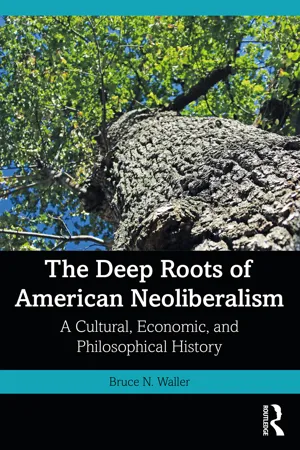American Frontier Culture
American Frontier Culture refers to the unique way of life and societal norms that developed in the American frontier during the westward expansion in the 18th and 19th centuries. It encompassed elements of individualism, self-reliance, and a pioneering spirit, as well as interactions with Native American tribes and the impact of the frontier on shaping American identity and values.
5 Key excerpts on "American Frontier Culture"
- eBook - ePub
The Deep Roots of American Neoliberalism
A Cultural, Economic, and Philosophical History
- Bruce N. Waller(Author)
- 2022(Publication Date)
- Routledge(Publisher)
...In our conceptual framework, the significance of the frontier can be explained by three factors. First, frontier locations attracted individualists able to thrive in harsh conditions. Second, frontier conditions – isolation and low population density – further cultivated self-reliance, and they offered favorable prospects for upward mobility through effort, nurturing hostility to redistribution. Finally, frontier conditions shaped local culture at a critical juncture, thus generating persistent effects. (2017, 1) As they note, European settlers who risked the journey to the east coast of North America were already moving from settled country to a frontier; and those – their descendants – who sought the risks and rewards farther west were powerfully drawn to the frontier life. Frederick Turner himself stated: “At first, the frontier was the Atlantic coast. It was the frontier of Europe in a very real sense. Moving westward, the frontier became more and more American” (1893). The most striking result from their research is the strong link between counties that had long periods of “total frontier experience” between 1790 and 1890 and an enduring contemporary attitude of rugged individualism. Counties that remained frontier for longer periods – counties in which (by measures of population density) the frontier endured rather than moving farther west, counties that for various reasons remained frontier rather than becoming settled – continue to this day to have stronger cultures of rugged individualism: including a tendency to support conservative policies such as preference for limited government and low tax levels and opposition to regulation (such as minimum wage levels) and to redistribution of wealth (such as welfare programs). Though the impact is stronger in some areas because of the enduring frontier, the authors conclude that “over the process of westward expansion, the frontier imbued a culture of rugged individualism throughout the US” (2017, 4)...
- Chris Rojek(Author)
- 2015(Publication Date)
- Polity(Publisher)
...5 Horizontal Frontierism: The Juggernaut of Character The concept of the frontier is familiar to students of American history and mythology (Billington 1966; Slotkin 1973, 1985, 1992). Insofar as there is a canonical text, it is surely Frederick Jackson Turner's (1893) famous thesis on ‘The Significance of the Frontier in American History’. The thesis was always intended to be a bold justification of American exceptionalism. By foregrounding the relationship between the rolling frontier and the efflorescence of American character, it conveniently legitimates pioneer land-grabbing and the organized slaughter of native American populations. Turner does not anticipate Theodor Roosevelt's (1889) frankly racist account, with its overtones of social Darwinism and pioneer triumphalism. For Roosevelt, it is the destiny of the racially superior group (White settlers) to annex the ‘wasteland’ and by means of ‘honest’ (White man's) industry and enterprise, build a new Canaan. Turner's account is more firmly rooted in republican political economy with its unflinching belief in the supreme virtue of enterprise and property in the cultivation of civilization. For him, the frontier is won by nourishing and advancing the three central components of American character, namely individualism, dynamism and a sacred respect for democracy. The ideal of conquering the frontier is a rallying point for presumed intimacy in settlers since it invests them with the moral superiority of following a noble quest. Throughout his study the connotation between the Western push and the heroism and vitality of Ancient Greek and Roman precedents resounds, but is never convincingly developed. Turner holds that only in America are the qualities of individualism, dynamism and democracy fully realized. The surplus land of the American West enables pioneers to skip beyond the barnacled integuments of stratified society on the Atlantic shore and the Old World...
- eBook - ePub
- Frederick Jackson Turner, Allan G. Bogue(Authors)
- 2012(Publication Date)
- Dover Publications(Publisher)
...Even the slavery struggle, which is made so exclusive an object of attention by writers like Professor von Holst, occupies its important place in American history because of its relation to westward expansion. In this advance, the frontier is the outer edge of the wave — the meeting point between savagery and civilization. Much has been written about the frontier from the point of view of border warfare and the chase, but as a field for the serious study of the economist and the historian it has been neglected. The American frontier is sharply distinguished from the European frontier — a fortified boundary line running through dense populations. The most significant thing about the American frontier is, that it lies at the hither edge of free land. In the census reports it is treated as the margin of that settlement which has a density of two or more to the square mile. The term is an elastic one, and for our purposes does not need sharp definition. We shall consider the whole frontier belt, including the Indian country and the outer margin of the “settled area” of the census reports. This paper will make no attempt to treat the subject exhaustively; its aim is simply to call attention to the frontier as a fertile field for investigation, and to suggest some of the problems which arise in connection with it. In the settlement of America we have to observe how European life entered the continent, and how America modified and developed that life and reacted on Europe. Our early history is the study of European germs developing in an American environment. Too exclusive attention has been paid by institutional students to the Germanic origins, too little to the American factors. The frontier is the line of most rapid and effective Americanization. The wilderness masters the colonist. It finds him a European in dress, industries, tools, modes of travel, and thought. It takes him from the railroad car and puts him in the birch canoe...
- eBook - ePub
- Frederick Jackson Turner(Author)
- 2015(Publication Date)
- Open Road Media(Publisher)
...Even the slavery struggle, which is made so exclusive an object of attention by writers like Professor von Holst, occupies its important place in American history because of its relation to westward expansion. In this advance, the frontier is the outer edge of the wave—the meeting point between savagery and civilization. Much has been written about the frontier from the point of view of border warfare and the chase, but as a field for the serious study of the economist and the historian it has been neglected. The American frontier is sharply distinguished from the European frontier—a fortified boundary line running through dense populations. The most significant thing about the American frontier is, that it lies at the hither edge of free land. In the census reports it is treated as the margin of that settlement which has a density of two or more to the square mile. The term is an elastic one, and for our purposes does not need sharp definition. We shall consider the whole frontier belt, including the Indian country and the outer margin of the “settled area” of the census reports. This paper will make no attempt to treat the subject exhaustively; its aim is simply to call attention to the frontier as a fertile field for investigation, and to suggest some of the problems which arise in connection with it. In the settlement of America we have to observe how European life entered the continent, and how America modified and developed that life and reacted on Europe. Our early history is the study of European germs developing in an American environment. Too exclusive attention has been paid by institutional students to the Germanic origins, too little to the American factors. The frontier is the line of m ost rapid and effective Americanization. The wilderness masters the colonist. It finds him a European in dress, industries, tools, modes of travel, and thought. It takes him from the railroad car and puts him in the birch canoe...
- eBook - ePub
- T. R. Fehrenbach(Author)
- 2014(Publication Date)
- Open Road Media(Publisher)
...II THE FRONTIER Few people today would deny that the “frontier” is alive and well in Texas. Observers of the Texas scene never fail to mention such things as the “frontier ethos,” the “frontier style,” or the “frontier heritage” of Texans, whether the subject is ranching on the Pecos or wheeler-dealering in Houston. The “frontier” in fact has become a cliché. Yet the term and concept stand for something very real in Texas, something which sets the state apart. Every part of the United States was of course a frontier at one time. However, the frontier was of very short duration in most places once British America had streamed across the Appalachians. The true frontier years, the period of deadly Indian peril, did not extend past a decade on the “dark and bloody” ground of Kentucky. The middle border was primitive and tough, but what was more remarkable historically was the speed with which civilization advanced. Daniel Boone broke trails to new ground no white man had seen, yet lived long enough to be driven to the Rockies and beyond by lawyers. The sons of Tennessee borderers had to look for new horizons, finding them in Texas. Kentucky was the key to the conquest of the continent; Texas was the culmination. Outside the Middle South, no other heavily populated region of the United States beyond the original thirteen colonies ever endured a genuine frontier experience, serving as a border and a buffer between American civilization and a wild country of hostile peoples. The forests were felled and villages organized almost overnight. Nowhere, Hollywood “history” notwithstanding, was there any protracted warfare between Indians and white civilians along a defined frontier after the eighteenth century—until Anglo-Americans reached Texas. Here Americans had to battle for predominance with a different nation and culture (the Mexicans), face a far more dangerous type of warlike aborigine, and master a land whose geography was strange and alien...




